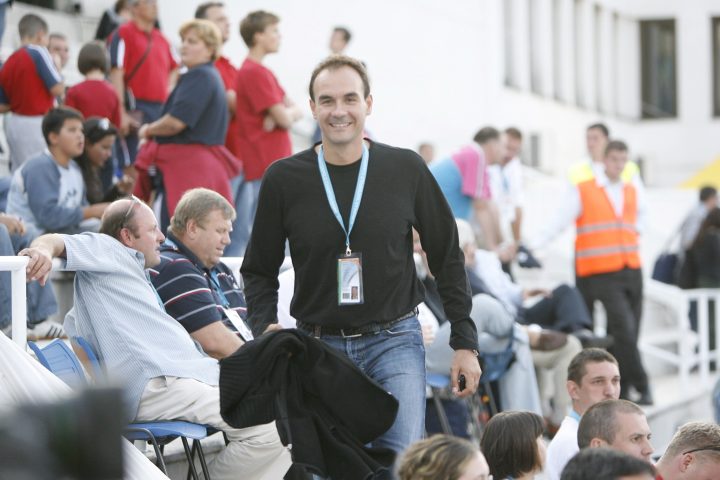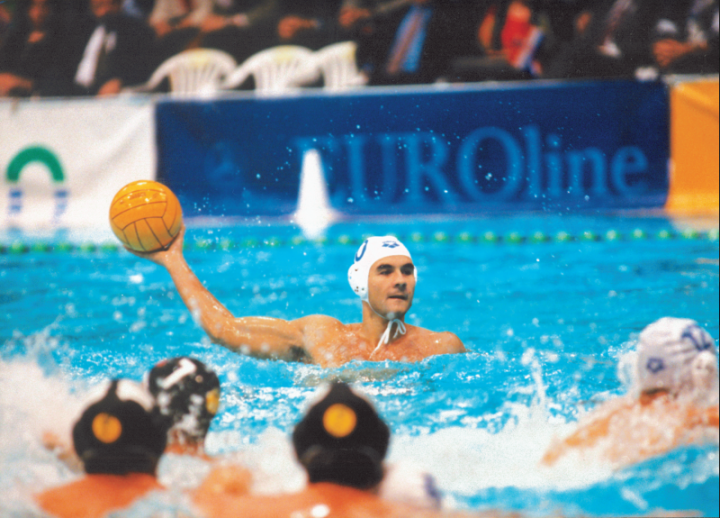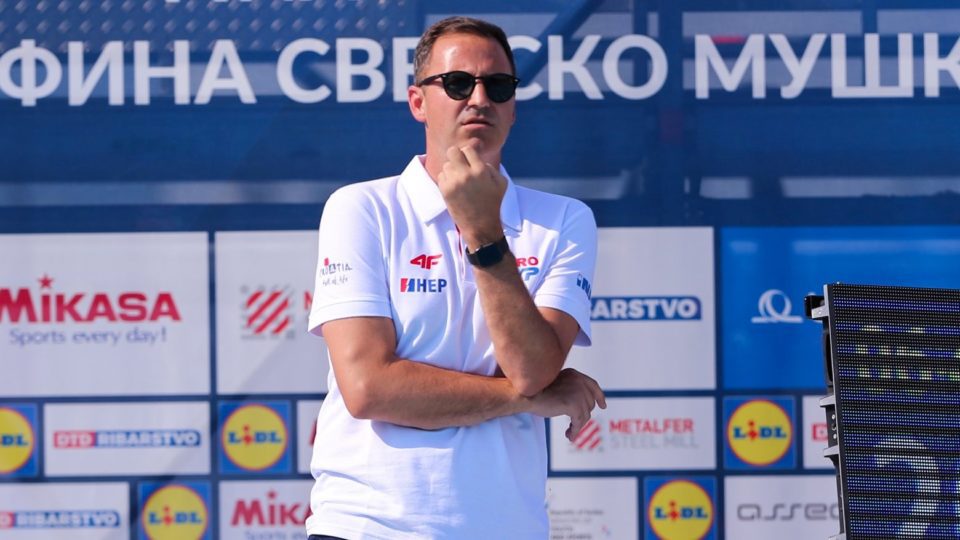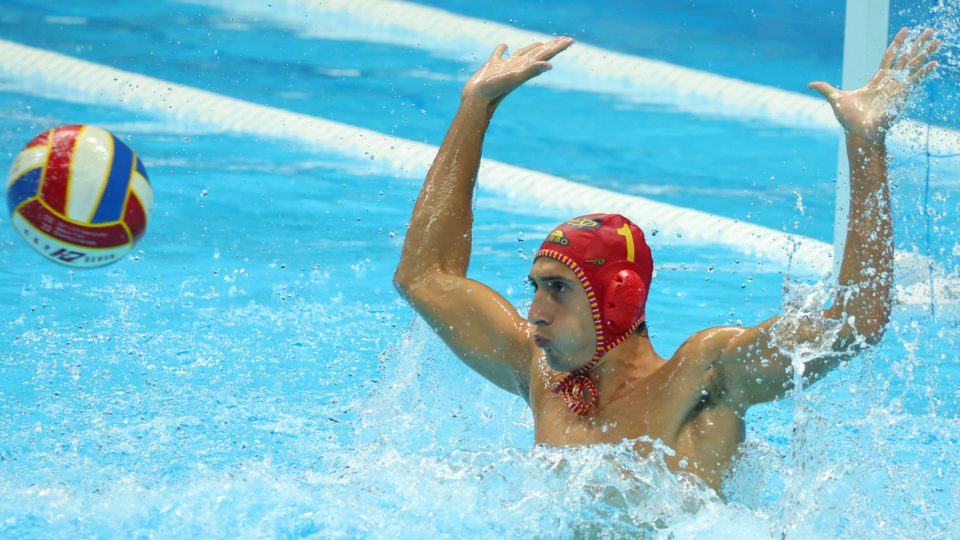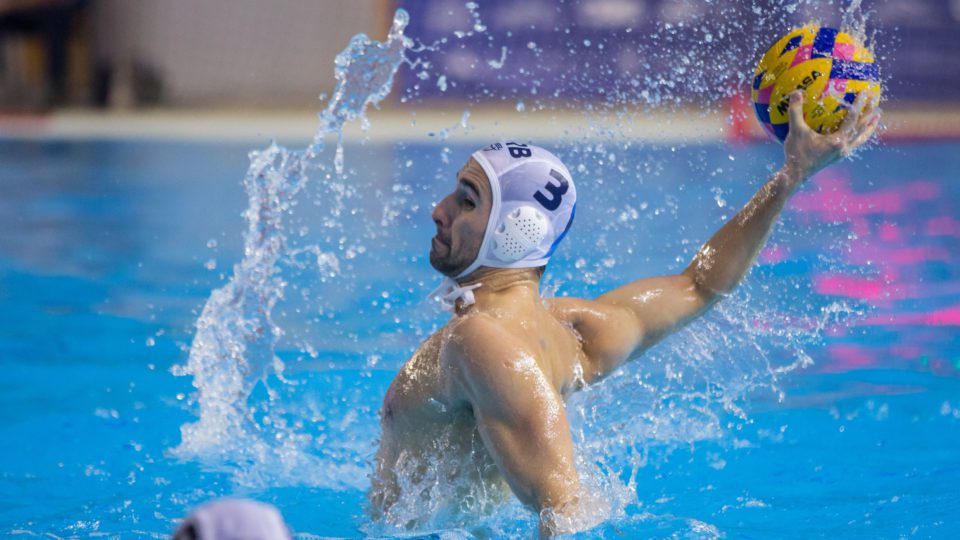We had the pleasure to talk to Perica Bukić — one of the greatest water polo players in the history of the sport. Bukić is currently the executive director of the Croatian Water Polo Association (HVS) and has a lot to share about the current state of water polo, both in Croatia and around the globe.
The Croatian National Team
Last year, for the first time since 2007, Croatia’s male water polo team became the world champion once again. Even during that period, it managed to regularly fight for the medals at the big competitions. What is the recipe for such success? What is the working system in the Croatian Water Polo Association that allows for this continual high performance?
Croatia has a great tradition in collective sports, with water polo being the most successful among them overall. I think the recipe for success is simple, but it requires much work to make it happen.
The synergy of the three most important segments is the key to success: Quality players, which Croatia has always had, the expert know-how, which may be the most important thing in every sport, and an organization that will connect, arrange and bring it all together.
With the arrival of the Golden Generation at the forefront of the Association (Bebić, Sukno, Roje, Lozica…), I think we have been able to create great desire and ambition in all of us. Also, we have generated the self-confidence to achieve more. And our goal was very clear — to reach the top of the world and stay there…for as long as possible.
Our first task was to bring Ratko Rudić back to Croatia, with which we established the basic precondition — a top coach. Later on, Ivica Tucak continued his career successfully. Everything else is history — the golden series from 2007 to 2017.
Two Olympic finals (London 2012, gold; Rio 2016, silver), Euro gold 2010 as hosts in Zagreb and the absolute world record — six medals in six consecutive world championships. Those include the gold in Melbourne 2007 and the gold in Budapest 2017.
We have established a high-quality professional work, both in seniors and in all other national selections. Through that system, we got trainers Tucak, Kobeščak, Fatović, Asić and more. We have provided financial conditions so that trainer programs of all selections can be carried out to the maximum. We paid special attention to the work of clubs, which are the fundamentals of every national sport.
We also pay special attention to our young players, both through the club system and through series of young national selections led by Neven Kovačević. We start with about sixty kids in the U-12 selection, then we have about fifty in the U-13, then, in U-14, we cut the numbers to around forty. The last selection — U-15, has around thirty representative candidates.
It is this investment in our youngsters, along with established systematic professional work, that is a precondition for the continuity of the sport’s success.
What would be a considered an achievement by the Croatian Water Polo Association in the upcoming European Championships?
For us as an association, success is winning one of the medals in the big competitions. Of course, we always want more than that. In some sports, players are successful when they pass the group and others consider themselves successful when they win a medal. We are truly satisfied only by winning the gold. Although, in a really strong competition, every medal is a success.
As for our performance in Barcelona, regardless of the absence of our captain and the world best player, Sandro Sukno, our goal stays the same: win one of the medals. A more ambitious goal is to come to the finals. And if we do, we will do everything to get the gold medal.
Is it realistic to expect Sandro Sukno to play in Barcelona? If not, is there a Croatian player who could replace him?
At this point, it is too early to make plans for Sandro Sukno’s career. Most importantly, the surgical procedure went well and the recovery runs smoothly. Sandro is feeling better every day.
Personally, I think his return to top form requires a longer time period. It is not smart to force a quick return. Which means it is not wise for Sandro to play in Barcelona, even if there was such an option. It is more important that Sandro recovers fully to be prepared for future sporting challenges.
As much as Sandro is irreplaceable, regarding his role in the pool and out of it as a captain and leader, I think we do have enough good players in Croatia who have already shown that we can count on them and that they can successfully replace him with additional effort.
Future Plans
What are the plans for Tokyo 2020?
As far as the Olympic games are concerned, considering the two consecutive finals, of course, we will also be trying to get the medal in Tokyo. But since the Games are the most important competition for every athlete, it will be hard to achieve since everyone has the desire to perform at their best. Which only means we will have to make extra efforts to get to the podium in Tokyo. Of course, the shinier the medal, the better. It would be very nice to play the Olympic Final for the third time in a row.
Where do you see women’s water polo in Croatia in the near future, Barcelona now and further down the road— Tokyo? What about the long-term development?
As for women’s water polo, in the last couple of years, we are trying to improve the prettier part of our beautiful sport in Croatia. Personally, I am very pleased that one of the most successful water polo coaches in Croatia — Dragan Matutinović — decided to try coaching women and took over the position of head coach for women’s senior national team.
We should be realistic and admit that at this time the quality of our girls’ games is still far behind the top 6 national teams in Europe, but I think Croatia will soon be among the top 8 in Europe, perhaps even on this European Championship.
We didn’t have much luck with the draw for Barcelona, but it will be a good opportunity for our girls to show what they know, as well as for us in the Association to see where we are at this moment. We have a really young and promising team. I expect our girls to play better and better with every competition.
Regarding the Olympic Games in Tokyo, unfortunately, the option for 12 female national teams was not accepted, which significantly lowered our chances to go to the Games. However, we are expecting our women’s national teams to shine after Tokyo, when our girls, within the range of 18-19 years, start progressing.
What are the Associations and federal commission’s plans to popularize women’s water polo in Croatia?
We are trying to help the clubs financially as much as we can because they are the foundations for any serious progress. Of course, the clubs have the most important job because the Association cannot handle the entire competition system at this moment.
Women’s clubs should be capable of “leaning” on men’s clubs both in organization and finances. But in this difficult times, it does not work like we want it.
However, since this year we started playing a regional women’s league, which already proved a great success. We got a couple of exceptionally strong and balanced matches, which mean a lot to our girls. To help them, the total cost of accommodation for the aforementioned teams and the cost of officials in the league were taken over by the respective water polo associations. The final of this competition is played in the same place as the men’s final and will be broadcasted live.
Also, since last year we have started with the girl’s camp as the first national selection, just like we have with boys. This cost was also taken over by our Association.
A particular problem is the totally misguided public perception of water polo being a men’s sport, while at the same time in the world’s biggest countries, women’s water polo is the fastest growing sport which often has bigger investments than men’s water polo. For example in the USA, Australia, China, Russia and the Netherlands, but also in traditionally strong Hungary, Spain, Greece a, d Italy.
So, we lack in numbers of girls — the base is extremely small and a lot of work awaits us in this field. Of course, with certain terms of work and training because, unfortunately, the girls are neglected in this segment. And the competition in the world is really outstanding.
The junior national teams are, like their senior’s role models, already traditionally successful at big competitions. Will the medals be imperative for the pre-season championship for the U-18 and U-19 selections?
The medals and successes of our youth teams are important, as well as creating a winning mentality, but the quality work that will “produce” future senior representatives is much more important. Of the aforementioned camps, all the selections that have major official competitions are expected to behave properly inside and outside the pool. Their efforts and commitment in their clubs, as well as their development and performance progression, are also important.
There is a huge step from a great junior to the same senior player, and that is a real challenge for the club and, of course, the Association. In that case, we are very excited about the competitions like the Europa Cup and World League, where great opportunities are given to young players, many of which are expected to become great in the future.
The Leagues
As for club water polo in Croatia, Water Polo Club “Jug” is still undefeated. Do you agree that there should be stronger competition in the national championship and even the Adriatic League? What can clubs do about this issue in order to approach or endanger Jug’s position in the upcoming seasons?
At this time, by its organization and sports results, Jug has proven its superiority both in Croatia and in the regional competition. It is certainly not easy for its competition to be better than them.
I personally think that Jug is looking forward to tougher competition to make these games more interesting and to make Gruž booked in matches again.
What is your opinion on the strengthening of the Hungarian club scene?
The change in Hungary’s overall policy regarding the significance and status of sports have contributed to the fact that the Hungarians made a huge step forward for water polo as one of their national sports. This benefited both the segments of the organization and their club’s successes.
The fact that Budapest hosted the European Championship in 2014, the World Championship in 2017, and will host the European Championship again in 2020, says enough about their financial and organizational potential.
All this has reflected on the quality and financial strength of their clubs. At this moment, the Hungarians have the Champions League winner and some exceptionally strong teams.
Let’s talk about the Champions League. How do you like the new format — Final Eight versus Final Six? Will the Final Eight be too exhausting for the players? And who is your favorite for the title in Genova?
We are yet to see the effects of the Final Eight in relation to the Final Six. I am personally convinced that the best form of play for the Champions League finals are home and away semifinals and final matches.
In my time, these were the most interesting games. Each one was prepared for a week, media attention was at its highest, the total number of visitors (in the former circumstances) was incomparable. And from the sports point of view, this was the fairest system that gave the advantage to no one side.
Pro Recco is certainly a favorite for the title for the best team in Europe, but so far, it has been shown that they have lost some important matches. Today, there are several really strong teams in European water polo and I expect an interesting ending for this competition.
Talking Old-School – a look back
As a player, you were one of the best in the world in this sport. Are there any elements in the game that are less used today compared to the times when you played actively?
Today, water polo is stronger and faster than in my time. And that is precisely because of increased work in the gym, better swimming and more power in the water. I think that along the way we lost some of the games “beauty”: Smart moves, great overview, sneaky passes, counter attacks and dribbling got lost.… I would say that times have changed.
As a comparison, how would your Silver Generation from Atlanta ‘96 go against today’s golden Barracudas?
I am really subjective on this matter, so it is hard to answer that question. It is very difficult to compare the training methods, even the rules of the game today, opposed to those 20 years ago.
During that time, we had a great national team. And perhaps even the best example of a quality organization in the management and planning segment when it comes to great sports successes.
But if we were leading the Croatian Water Polo Association back in the day, we would have never allowed such a great team to break down. Unfortunately, the vast majority ended their national team careers there.
Back then, I was the captain and the oldest player (I was 30). Everyone else was younger, and some were a lot younger. After that misguided assessment of the Association’s leading structures, it took us 10 years to climb back to the top of the world.
Water Polo and Media
The water polo public is quite divided around the attitudes of popularizing water polo. Some believe that rules need to be changed, others call for larger marketing investments. What is your opinion on that? What needs to be changed so that water polo becomes more understandable and accessible to wider masses? How to bring the audiences to the stands? Should the rules be changed more frequently?
I think there are several segments that we should deal with. The rules are one of them, but not the most important one. It is crucial to have quality teams and interesting, balanced matches.
However, I would emphasize the following: the calendar of competitions is one of the most important questions. We should try at least moving a part of the club season to summer. That way, we would increase the opportunities of playing in open-air pools, thus attracting more viewers. I am convinced that every competition can get better if we have the organizational capacities for an audience of 5000 people or more.
Marketing and PR are the foundation of every sport today. And when you have the opportunity to make a profit in relation to the number of cards sold, there is a clear “math” of how much of the funds you need to invest to keep the stands full.
Before, this media announcement was happening by itself. Just remember the time of the great success at Mladost. At every semifinal and final, no matter if it was the Champions League, the LEN Cup or the national league, the stands were full. And that was due to media tracking and announcements. Today, such announcement need to be paid for and it is more important to find the option of self-sustainability in terms of the financial viability of PR investment.
Positive examples of this are most of the great competitions that were played under the aforementioned conditions. From the European Championships in Zagreb, where we had nearly 6000 spectators on the matches and the interest was very high, to the European Championship in 2016 played in Belgrade Arena with the capacity of 16000 spectators. On the final game, people asked for extra seats. In the end, there was Budapest and the World Championship where there were about 7000 to 8000 viewers. Also, the Olympic Games in London were a great example, where the pools were filled with viewers even though the tickets were extremely expensive.
What is your opinion on the club season during summer months?
I think there should be opportunities to extend the club season in the summer. Except for the year of the Olympic Game, which is a global event, the events could be better arranged.
Today, all or at least most of the European and World Championships play in large indoor halls and I think that there is no reason for big contests not to play in fall, regardless of a few minor problems such as school or college obligations. The time when coaches had three months to prepare for the tournament is over.
Today, in all seasonal sports, the season is a mix of national and club games. This would allow players the necessary rest — a one-month break, which is important to the players both psychologically and physically.
Our task as a global water polo portal is to bring players and sports closer to the interested public through interesting content. However, the experience from the World Youth Championship in Belgrade, where we were placed in a position where it was impossible to see what is happening in the pool and where we are not allowed to make conversation immediately after matches led us to certain questions.
Do LEN and FINA talk about media relations and is it planned to allow the media to do their work under adequate conditions to share the content with the public as quickly and as efficiently as possible?
I hope that this has been a secluded experience and that the media generally have no problems. The importance of the media today is huge. Especially for the reputations of a sport. I believe that all of us who are active in any segment of sports activities should be aware of these facts.
To LEN and FINA, this attitude is a priority, but I personally witnessed that often trainers and players do not meet the intended media commitments well enough. In this, I think we need to educate direct participants of sports events about the importance of media presentations, giving interviews from coaches and best players after the games.
One example is a microphone that directly transmits the tactical ideas of coaches to viewers during the time-out. Of course, the coaches are not happy to publicly present the way they prepare for a certain tactical play, but to the viewers, that is one of the most interesting details of the game and we need to adapt to the wishes of a wider audience.
We have an example from the NBA, where media enters the dressing room before and after the game to show the spectators what is happening. Regarding this, I think we have plenty of room for improvement in water polo.
We would like to thank Perica Bukić for taking the time to talk to us. Also, we hope that some changes will occur in water polo in Croatia and in general. Not long ago, we talked to Ivana and Domina Butić about water polo in Croatia. Check out their interview here!
As always, make sure you follow us on Twitter and Facebook for the latest news from the water polo world!an




